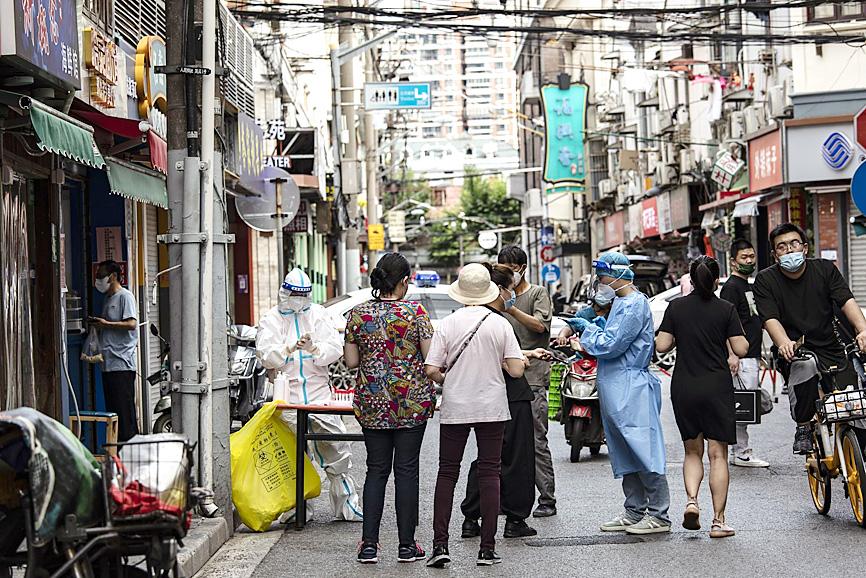China is racing to quash a new COVID-19 flareup that risks spilling over into one of its most economically significant regions, raising the specter of disruptions that could roil global supply chains for solar panels, medicines and semiconductors.
Infections have surged in Si County in the eastern province of Anhui, with officials reporting 287 cases for Sunday and nearly 1,000 since late last week. Authorities locked down Si and a neighboring county late last week to try and stop the virus from spreading to Jiangsu Province, the second-biggest contributor to China’s economic output and a globally important manufacturing hub for the solar sector.
However, cases there are already increasing. The city of Wuxi, a biotech hub, reported 35 infections and suspended dine-in services at restaurants and closed entertainment venues.

Photo: Bloomberg
Zhejiang Province and Shanghai have also reported COVID-19-positive patients, fueling concerns about the broader impact across the Yangtze River Delta region that accounts for one-quarter of China’s economy.
The fresh outbreaks will be a major test for Chinese President Xi Jinping’s (習近平) virus strategy. He last week reaffirmed that China would stick to “zero COVID” — which relies on lockdowns and frequent mass testing to stamp out infections — and said the country would rather endure some temporary impact on economic development than let the virus hurt people’s safety and health.
China is only starting to show signs of a nascent recovery from its most recent run of outbreaks, including the bruising two-month lockdown of Shanghai that caused massive manufacturing disruptions and snarled global supply chains.
While the epicenter of the latest outbreak is so far only one small county, and authorities have not imposed lockdowns in any of the major regional hubs, any escalation in restrictions has the potential to ripple worldwide.
More than one-third of global solar panel manufacturing capacity is in Jiangsu, according to BloombergNEF data, and it is also the leading producer of solar cells and wafers. The Yangtze River Delta is also a key maker of components for the iPhone and Mac laptops, semiconductors, as well as home to drugmakers and e-commerce operations. Some manufacturers still are not back to normal after earlier outbreaks.
China reported 380 cases for Sunday, bringing nationwide infections to a level last seen in late May, when Shanghai was on the verge of lifting its lockdown.
The financial hub, which neighbors Jiangsu, reported three local cases on Sunday. One was found outside government quarantine after six days of the city reporting no community infections.
Zhao Dandan, a vice director at Shanghai’s municipal health commission, cautioned in a briefing on Sunday that the city still faces risks of a rebound in COVID-19 cases. Beijing reported no new cases.
Elsewhere, Ningde City in Fujian Province found 10 new COVID-19 cases and implemented control measures. The city is the headquarters of Contemporary Amperex Technology Co, the largest maker of batteries for electric cars.
Nearly half of China’s major cities are suffering “moderate to severe” levels of subsidence, putting millions of people at risk of flooding, especially as sea levels rise, according to a study of nationwide satellite data released yesterday. The authors of the paper, published by the journal Science, found that 45 percent of China’s urban land was sinking faster than 3mm per year, with 16 percent at more than 10mm per year, driven not only by declining water tables, but also the sheer weight of the built environment. With China’s urban population already in excess of 900 million people, “even a small portion

UNSETTLING IMAGES: The scene took place in front of TV crews covering the Trump trial, with a CNN anchor calling it an ‘emotional and unbelievably disturbing moment’ A man who doused himself in an accelerant and set himself on fire outside the courthouse where former US president Donald Trump is on trial has died, police said yesterday. The New York City Police Department (NYPD) said the man was declared dead by staff at an area hospital. The man was in Collect Pond Park at about 1:30pm on Friday when he took out pamphlets espousing conspiracy theories, tossed them around, then doused himself in an accelerant and set himself on fire, officials and witnesses said. A large number of police officers were nearby when it happened. Some officers and bystanders rushed

Beijing is continuing to commit genocide and crimes against humanity against Uyghurs and other Muslim minorities in its western Xinjiang province, U.S. Secretary of State Antony Blinken said in a report published on Monday, ahead of his planned visit to China this week. The State Department’s annual human rights report, which documents abuses recorded all over the world during the previous calendar year, repeated language from previous years on the treatment of Muslims in Xinjiang, but the publication raises the issue ahead of delicate talks, including on the war in Ukraine and global trade, between the top U.S. diplomat and Chinese

HYPOCRISY? The Chinese Ministry of Foreign Affairs yesterday asked whether Biden was talking about China or the US when he used the word ‘xenophobic’ US President Joe Biden on Wednesday called for a hike in steel tariffs on China, accusing Beijing of cheating as he spoke at a campaign event in Pennsylvania. Biden accused China of xenophobia, too, in a speech to union members in Pittsburgh. “They’re not competing, they’re cheating. They’re cheating and we’ve seen the damage here in America,” Biden said. Chinese steel companies “don’t need to worry about making a profit because the Chinese government is subsidizing them so heavily,” he said. Biden said he had called for the US Trade Representative to triple the tariff rates for Chinese steel and aluminum if Beijing was